
FACULTY OF ARTS AND SCIENCES
Department of Sociology
SOC 315 | Course Introduction and Application Information
| Course Name |
History of Revolutions
|
|
Code
|
Semester
|
Theory
(hour/week) |
Application/Lab
(hour/week) |
Local Credits
|
ECTS
|
|
SOC 315
|
Fall/Spring
|
3
|
0
|
3
|
6
|
| Prerequisites |
None
|
|||||
| Course Language |
English
|
|||||
| Course Type |
Elective
|
|||||
| Course Level |
First Cycle
|
|||||
| Mode of Delivery | - | |||||
| Teaching Methods and Techniques of the Course | - | |||||
| Course Coordinator | - | |||||
| Course Lecturer(s) | ||||||
| Assistant(s) | - | |||||
| Course Objectives | This course has two goals. One is to introduce the sociological literature on revolutions, and the other is to acquaint students with the main cases of revolutions. |
| Learning Outcomes |
The students who succeeded in this course;
|
| Course Description | This course focuses on theories of revolutions along with the cases of main revolutions that emerged in the modern world. |
|
|
Core Courses | |
| Major Area Courses |
X
|
|
| Supportive Courses | ||
| Media and Management Skills Courses | ||
| Transferable Skill Courses |
WEEKLY SUBJECTS AND RELATED PREPARATION STUDIES
| Week | Subjects | Related Preparation |
| 1 | Introduction | Presentation and an overview of the course, course organization, requirements and methods of evaluation |
| 2 | What is a protest? What is a social movement? | Donatella Della Porta and Mario Diani. 2006. “Studying Social Movements”, chapter 1 In Social Movements: An Introduction. Oxford: Blackwell. 1- 29. Hank Johnston, 2014. “What is a Social Movement”? chapter 1 in What is a Social Movement. Polity Press. |
| 3 | What is a revolution? | Berch Berberoglu. 2019. “Introduction: Dynamics of Social Movements, Revolution, and Social Transformation” in The Palgrave Handbook of Social Movements, Revolution, and Social Transformation-Springer International Publishing. |
| 4 | Theoretical Approaches to Revolutions | John Foran.2015. “Theorizing revolutions” in Taking Power: On the Origins of Third World Revolutions. Jack A Goldstone. 1982. The Comparative and Historical Study of Revolutions. Annual Review of Sociology 8:187-207. Berch Berberoglu. 2019. “The Marxist Theory of Social Movements, Revolution, and Social Transformation” in The Palgrave Handbook of Social Movements, Revolution, and Social Transformation-Springer International Publishing. |
| 5 | Theoretical Approaches to Revolutions | Ernesto Laclau. 1990. New Reflections on the Revolution of Our Time. |
| 6 | MIDTERM EXAM | |
| 7 | The French Revolution | Documentary Screening |
| 8 | The French Revolution | Eric Hobsbawm. 1996. “The French Revolution” in The Age of Revolution: 789-1848. Jack Goldstone. 2016. “The Developing Crisis of French Absolutism, 1700–1789” in Revolution And Rebellion in the Early Modern World: Population Change and State Breakdown in England, France, Turkey, and China, 1600–1850. |
| 9 | The Russian Revolution | Documentary Screening |
| 10 | The Russian Revolution | James Defronzo. 2015.”The Russian Revolutions and Eastern Europe” in Revolutions and Revolutionary Movements, Westview Press. |
| 11 | The Chinese Revolution The Cuban Revolution | James F. Petras. 2019. “Twentieth-Century Socialist Revolutions and Their Class Components: Russia, China, Cuba, and Vietnam” in The Palgrave Handbook of Social Movements, Revolution, and Social Transformation-Springer International Publishing. James Defronzo. 2015. “Revolution in China” in Revolutions and Revolutionary Movements, Westview Press. James Defronzo. 2015. “The Cuban Revolution” in Revolutions and Revolutionary Movements, Westview Press. |
| 12 | The Iranian Revolution | Maryam Poya IRAN 1979: Long live Revolution! ... Long live Islam? |
| 13 | The Revolutions of 1989 | Adrian Pop. 2013. The 1989 Revolutions in Retrospect. Europe-Asia Studies, Volume 65, Issue 2 Michael Bernhard. 2010. The revolutions of 1989: twenty years later. Angelaki, Volume 15, 2010 - Issue 3 |
| 14 | Revolutions of Our Time? | Asef Bayat. 2017. “Half Revolution, No Revolution” in Revolution without Revolutionaries: Making Sense of the Arab Spring. Stanford University Press. |
| 15 | Review of the semester | |
| 16 | Final exam |
| Course Notes/Textbooks | the related chapters in the books mentioned |
| Suggested Readings/Materials |
EVALUATION SYSTEM
| Semester Activities | Number | Weigthing |
| Participation | ||
| Laboratory / Application | ||
| Field Work | ||
| Quizzes / Studio Critiques | ||
| Portfolio | ||
| Homework / Assignments |
1
|
15
|
| Presentation / Jury | ||
| Project | ||
| Seminar / Workshop | ||
| Oral Exams | ||
| Midterm |
2
|
50
|
| Final Exam |
1
|
35
|
| Total |
| Weighting of Semester Activities on the Final Grade |
2
|
50
|
| Weighting of End-of-Semester Activities on the Final Grade |
1
|
50
|
| Total |
ECTS / WORKLOAD TABLE
| Semester Activities | Number | Duration (Hours) | Workload |
|---|---|---|---|
| Theoretical Course Hours (Including exam week: 16 x total hours) |
16
|
3
|
48
|
| Laboratory / Application Hours (Including exam week: '.16.' x total hours) |
16
|
0
|
|
| Study Hours Out of Class |
15
|
3
|
45
|
| Field Work |
0
|
||
| Quizzes / Studio Critiques |
0
|
||
| Portfolio |
0
|
||
| Homework / Assignments |
1
|
10
|
10
|
| Presentation / Jury |
0
|
||
| Project |
0
|
||
| Seminar / Workshop |
0
|
||
| Oral Exam |
0
|
||
| Midterms |
2
|
20
|
40
|
| Final Exam |
1
|
37
|
37
|
| Total |
180
|
COURSE LEARNING OUTCOMES AND PROGRAM QUALIFICATIONS RELATIONSHIP
|
#
|
Program Competencies/Outcomes |
* Contribution Level
|
||||
|
1
|
2
|
3
|
4
|
5
|
||
| 1 | To have the knowledge of classical and contemporary theories in sociology, and be able to comparatively analyze these theories. |
X | ||||
| 2 | To have the knowledge of main methodological approaches in sociology as well as social research and data analysis methods. |
X | ||||
| 3 | To have knowledge in the fields of general sociology, sociology of institutions, social structure and change, and applied sociology. |
X | ||||
| 4 | To be able to determine the appropriate methods in the design of the planning stage and conclusion of a sociological project, individually or as part of a team. |
X | ||||
| 5 | To be able to diagnose the social dynamics behind personal problems by using sociological imagination. |
X | ||||
| 6 | To be able to define social problems at local, national, and global level, and offer new policies for solutions. |
X | ||||
| 7 | To be able to apply commonly-used computer programs for data collection and analysis in sociological research. |
|||||
| 8 | To be able to develop a socially responsible, scientific and ethical perspective regarding the collection, analysis, interpretation and presentation of data. |
X | ||||
| 9 | To be able to analyze different aspects of the social world by drawing on the knowledge produced by other disciplines of the social sciences. |
X | ||||
| 10 | To be able to constantly renew herself/himself professionally by following scientific and technological developments in sociology and social research. |
|||||
| 11 | To be able to collect sociological data and communicate with sociologists and other social scientists in a foreign language ("European Language Portfolio Global Scale", Level B1). |
|||||
| 12 | To be able to speak a second foreign at a medium level of fluency efficiently. |
|||||
| 13 | To be able to relate the knowledge accumulated throughout the human history to their field of expertise. |
X | ||||
*1 Lowest, 2 Low, 3 Average, 4 High, 5 Highest
NEWS |ALL NEWS
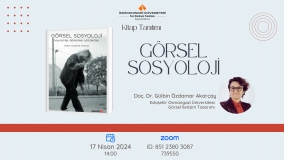
Book Presentation and Talk: Visual Sociology
Department of Sociology invites you to the Book Presentation and Talk event with Gülbin Özdamar Akarçay, the author of “Visual Sociology". Date:
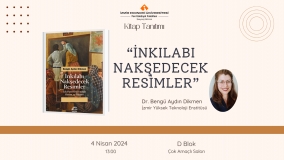
Book Presentation and Talk: Painting the Revolution
Department of Sociology invites you to the Book Presentation and Talk event with Dr. Bengü Aydın Dikmen, the author of “Painting the
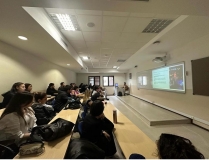
We welcomed ethnomusicologist Onur Sönmez.
We held our sociology seminar where we hosted ethnomusicologist Onur Sönmez. We thank him very much for this detailed and interesting presentation.
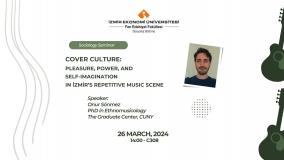
Cover Culture: Pleasure, Power, and Self-Imagination in İzmir’s Repetitive Music Scene
You are cordially invited to the Sociology Seminar where we will host Dr. Onur Sönmez. Onur Sönmez has a PhD in ethnomusicology
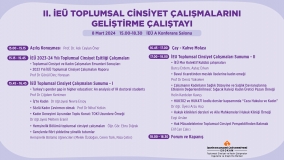
II. IUE GENDER STUDIES DEVELOPMENT WORKSHOP (EKOKAM- Gender and Women’s Studies Research and Application Center)
Research Assistant Helin Kardelen Kavuş attended the “II. IUE Gender Studies Development Workshop” on March 8, 2024, International Women's Day. Organized by EKOKAM, the workshop
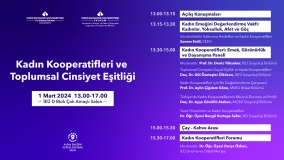
Women’s Cooperatives and Gender Equality
You are cordially invited to "Women's Cooperatives and Gender Equality", which will be co-organized by IUE EKOKAM, the Department of Sociology, and
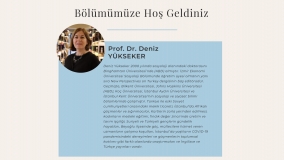
Welcoming Our New Faculty Member: Professor Deniz Yükseker
We are proud to welcome and introduce our newest faculty member: Professor Deniz Yükseker. We wish her all the best and success
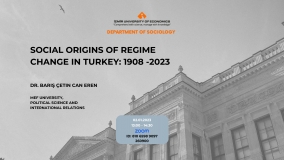
Sociology Seminar: Social Origins of Regime Change in Turkey: 1908 -2023
Department of Sociology cordially invites you to a seminar on "Social Origins of Regime Change in Turkey: 1908 - 2023" by Dr.



